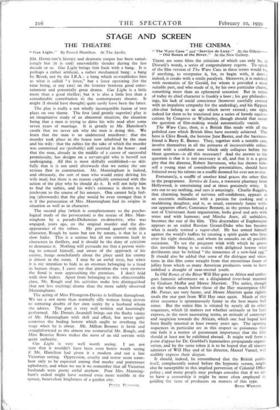STAGE AND SCREEN
THE THEATRE
" Gas Light." By Patrick Hamilton. At The Apollo.
MR. HAMILTON'S literary and dramatic output has been tantal- isingly but (it is said) unavoidably slender during the last decade or so. Gas Light brings him back with a bang. It is
perhaps a rather artificial, a rather mechanical bang : a bang by Brock, not by the I.R.A.: a bang which re-establishes him as what is called "a force," but a force operating (for the time being, at any rate) on the frontier between good enter-
tainment and potentially great drama. Gas Light is a little more than a good thriller; but it is also a little less than a
considerable contribution to the contemporary theatre. It might (I should have thought) quite easily have been the latter. The play is really a not wholly incompatible fusion of two plays on one theme. The first (and greatly superior) play is an imaginative study of an abnormal situation, the situation being that a man is trying to drive his wife mad after some seven years of marriage. It is greatly to Mr. Hamilton's credit that we never ask why the man is doing this. We learn that the man is an undetected murderer : that the murder took place in the house now inhabited by the man and his wife : that the rubies for the sake of which the murder was committed are (probably) still secreted in the house : and that the man, already in the middle of a career of successful promiscuity, has designs on a servant-girl who is herself not undesigning. All this is most skilfully established—so skil- fully that it is not until afterwards that we notice the one serious flaw in construction. Mr. Manningham is indeed, and obviously, the sort of man who would enjoy driving his wife mad; but there is no reason explicitly connected with the action of the play why he should do it. It will not help him to find the rubies, and his wife's existence is shown to be irrelevant to the course of his amours. One cannot help feel- ing (afterwards) that the play would be even stronger than it is if the persecution of Mrs. Manningham had its origins in situation as well as in character.
The second play (which is complementary to the psycho-. logical study of the persecution) is the rescue of Mrs. Man- ningham by a pseudo-Dickensian ex-detective, who was engaged, years ago, on the original murder and the dis- appearance of the rubies. My personal quarrel with this character, Rough by name but not by nature, is that he is a slow hider. This is a serious but all too common fault in characters in thrillers, and it should be the duty of criticism to denounce it. Nothing will persuade me that a person wish- ing to conceal himself, and aware of the approach of his enemy, hangs nonchalantly about the place until his enemy is almost in the room. I may be an awful sissy, but when it is my intention to hide in an ottoman belonging to a fiend in human shape, I carry out that intention the very moment the fiend is seen approaching the premises. I don't hold with slow hiders. Apart from belonging to this objectionable class, Mr. Rough and his activities make less distinguished (but not less exciting) drama than the more subtly observed Manninghams.
The acting of Miss Ffrangcon-Davies is brilliant throughout. We see a not more than normally silly woman being driven to torturing doubts of her own sanity by a husband whom she adores. The part is very well written and hauntingly performed. Mr. Dennis Arundell brings out the flashy vanity of Mr. Manningham with skill and effect, but never quite contrives the boding horror which ought to overhang the stage when he is about. Mr. Milton Rosmer is brisk and straightforward as the almost too resourceful Mr. Rough, and Miss Beatrice Rowe makes the most of an old servant with quiet authority.
Gas Light is very well worth seeing. I am not sure that it wouldn't have been even better worth seeing if Mr. Hamilton had given it a modern and not a late Victorian setting. Oppression, cruelty and terror seem some- how only to be expected among that murky and portentous upholstery, and when we see it we remember that all Victorian husbands were pretty awful anyhow. Poor Mrs. Manning- ham's ordeal might have seemed even more terrible in the spruce, benevolent brightness of a garden city.
P:-.Trn F:_n-zsze.














































 Previous page
Previous page